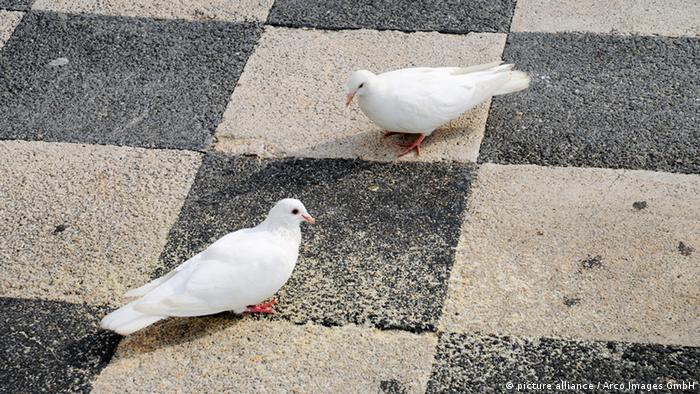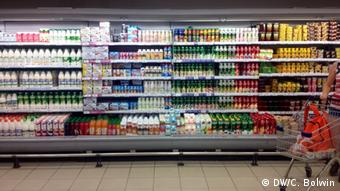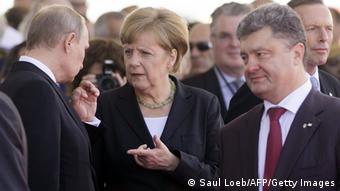Can there be calm after the Russian convoy?
Can there be calm after the Russian convoy?
Few expect a major breakthrough when European, Ukrainian and Russian leaders meet this weekend. When a Russian convoy crossed into Ukraine without permission, the situation gets even more complicated.
German Chancellor Angela Merkel is expected Saturday in Kyiv, where she will hold talks with Ukrainian President Petro Poroshenko and Prime Minister Arseniy Yatsenyuk. It will be MerkeI's first trip to Ukraine since the start of the crisis. The visit falls on the 75th anniversary of the Hitler-Stalin pact.
Merkel will use the visit to make clear that "Germany will never again sign a contract with another country in Europe to the detriment of a third," said Michael Gahler, a member of European Parliament from Merkel's Christian Democratic Union.
On Tuesday, the presidents of Russia and Ukraine are due to meet in the Belarusian capital Minsk. The last time the pair met was at the start of June in France. Representatives of the Eurasian Economic Union, made up of Russia, Belarus and Kazakhstan, are keen to be at the meeting in Minsk. The European Union's foreign policy chief, Catherine Ashton, as well as the EU commissioners for trade and energy, also want to attend.
The battles rage on
The fact that the Minsk meeting is even happening - if it does in fact happen - is a small sensation - especially officials in Kyiv accused Russia of a "direct invasion" when a convoy of trucks crossed the border on Friday without permission. Moscow said the vehicles make up an aid convoy to improve the lives of people suffering in eastern Ukraine.
Since the meeting between Putin and Poroshenko in spring, fighting in eastern Ukraine has increased. The economic dispute has also come to a head as the EU imposed economic sanctions on Russia and Moscow reacted by banning EU food imports. Whoever thought that the announcement of a new round of talks would calm heated tempers has been left disappointed as the battles rage on.
Amanda Paul, an eastern European expert at the Brussels-based European Policy Centre think tank, said she doesn't believe "anyone expects a major breakthrough in either of the two meetings, but it is important that the communication channels remain open."
Doubt over the success of the talks can also be attributed to the fact that both sides have differing ideas of what the meeting in Minsk will address. Poroshenko said he wants to talk about a "stabilizing of the situation" in eastern Ukraine. Meanwhile, an advisor to Putin said the Russian president intends to discuss the worsening humanitarian situation in Ukraine.
A rip in Putin's union
The role of the EU in Minsk will be partially defined by the commissars making the trip to Belarus. Energy Commissar Günther Oettinger is keen to reconcile the gas disagreement between Russia and Ukraine - a fight that indirectly affects the EU as the bloc's gas passes through Ukraine.
Trade Commissioner Karel De Gucht will outline the EU's Association Agreement with Ukraine, which includes a free trade deal. He is also expected to try to explain to the Russians that the arrangement with Ukraine is not anti-Russian and Russia could even profit from the EU-Ukraine agreement. Moscow unsuccessfully tried to convince Kyiv to join its new economic union with other former Soviet republics rather than pursue closer ties to the EU.
Debate in Ukraine over whether to deepen relations with the EU or Russia originally sparked the Maidan protests that ousted the former Ukrainian President Vikor Yanukovych and ultimately contributed to the current conflict in eastern Ukraine as well as the annexation of Crimea by Russia.
Kazakhstan and the meeting host, Belarus, could facilitate a compromise according to Paul. She said the two countries have "different perceptions" of the customs union than leading power Russia.
European parliamentarian Gahler said he hopes Putin recognizes that his behavior "damages not only Russia, but also the other countries in his customs union." The Russian president shouldn't think that the EU will be worn down in terms of sanctions. Ashton would in fact say the opposite - that "emergency sanctions have to be expanded so as to bring him to sanity," Gahler added.
Merkel's role
Still, much of the summits' outcomes will depend on the preparation of the German chancellor. Merkel will talk to Ukrainian representatives about what kind of EU support is needed to stabilize the Ukraine, but also lay out what the EU expects from the Ukrainian government. Merkel will have to curb Kyiv's desire for full membership in the EU and NATO. The EU is doing all they can to find a way out of the conflict - and that has nothing to do with a Western integration of the Ukraine. One danger of Merkel's visit is that Ukrainians expect too much to come of it.
Rebecca Harms, a member of European Parliament from the German Greens, was critical of Merkel's role. Harms, who was in the Ukraine at the end of July, said that Merkel is perceived there as being pro-Russian. "The photos of Merkel and Putin at the World Cup in Brazil did a lot of damage," Harms said, adding that there was an impression in Ukraine "that Germany did not support the decisions made on sanctions until it was already too late."
All in all though, Harms said she supports Germany's efforts in the talks. Harms, like Gahlen, said she wanted the EU to play a larger role.
"Merkel isn't traveling to Kyiv just as Germany's chancellor," Gahlen said. "She's traveling in the name of all other Europeans."
Merkel is, however, the "main actor in the talks between Russia and Ukraine," according to eastern Europe expert Paul, who added that the meeting between Poroshenko and Putin is largely happening at the chancellor's request. dw de



Comments